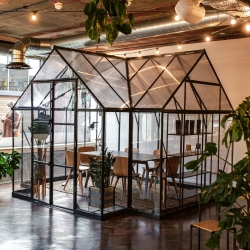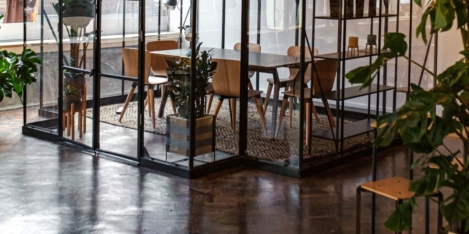August 10, 2021
Search Results for: Working from home
August 10, 2021
Almost half of young people feel the pandemic has harmed their long-term career prospects
by Jayne Smith • News, Working culture, Working lives
 With A level results day marking a new cohort of young people entering the toughest labour market for a generation, the CIPD launches its One Million Chances campaign. (more…)
With A level results day marking a new cohort of young people entering the toughest labour market for a generation, the CIPD launches its One Million Chances campaign. (more…)
August 9, 2021
DESSO Serene and Serene Colour carpet tiles for offices that people want to return to
by Freddie Steele • Company news
 Working from home has not only laid bare just how much we miss interaction with colleagues, but also how the office could and should support employees to work and feel better, so that they will not only feel safe to return, but will want to return. Through Tarkett’s extensive research on office worker’s attitudes towards returning to the office, a successful workplace that supports employees to thrive needs to prioritise collaboration, flexibility and sustainability. (more…)
Working from home has not only laid bare just how much we miss interaction with colleagues, but also how the office could and should support employees to work and feel better, so that they will not only feel safe to return, but will want to return. Through Tarkett’s extensive research on office worker’s attitudes towards returning to the office, a successful workplace that supports employees to thrive needs to prioritise collaboration, flexibility and sustainability. (more…)
August 6, 2021
Arrival of paperless office may have been accelerated by lockdowns
by Neil Franklin • News
 One of the least talked about potential casualties of the recent lockdowns is the printed page. In a sign that the arrival of the paperless office may have been accelerated, total worldwide page volumes printed from office and home devices plummeted nearly 14 percent year in 2020 after several years of stable but slow decline. According to the research from International Data Corporation (IDC), 2.8 trillion pages were printed in 2020. The COVID-19 pandemic and the dramatic shift from offices to work from home models are behind the sharp decline, even for those who can manage to get a printer to work in the first place. (more…)
One of the least talked about potential casualties of the recent lockdowns is the printed page. In a sign that the arrival of the paperless office may have been accelerated, total worldwide page volumes printed from office and home devices plummeted nearly 14 percent year in 2020 after several years of stable but slow decline. According to the research from International Data Corporation (IDC), 2.8 trillion pages were printed in 2020. The COVID-19 pandemic and the dramatic shift from offices to work from home models are behind the sharp decline, even for those who can manage to get a printer to work in the first place. (more…)
August 6, 2021
Managers and workers have different perception of the future ‘employee experience’
by Neil Franklin • Flexible working, News, Technology, Working culture
 A gap is emerging between executive and employee perceptions on the future of the ’employee experience’, according to a report from Gartner. The 2021 Gartner Hybrid Work Employee Survey of 4,000 employees in January 2021 claims that there are six perception gaps that employers must resolve. The Gartner survey claims that 75 percent of executive leaders believe they are already offering a flexible employee experience, yet only 57 percent of employees indicate that their organisational culture embraces flexible working. Further, nearly three-quarters of executives believe the business understands how flexible work patterns support employees, but only half of employees share this view. (more…)
A gap is emerging between executive and employee perceptions on the future of the ’employee experience’, according to a report from Gartner. The 2021 Gartner Hybrid Work Employee Survey of 4,000 employees in January 2021 claims that there are six perception gaps that employers must resolve. The Gartner survey claims that 75 percent of executive leaders believe they are already offering a flexible employee experience, yet only 57 percent of employees indicate that their organisational culture embraces flexible working. Further, nearly three-quarters of executives believe the business understands how flexible work patterns support employees, but only half of employees share this view. (more…)
August 4, 2021
No rush to get back to the office despite easing of restrictions
by Alexandra Anders • Comment, Flexible working, Working culture
 Restrictions may have been lifted but there is no major rush for everyone to head back to the office. Many firms are being cautious about bringing employees back and the official government guidance is for employers to plan a gradual, safe return to places of work. Official guidelines aside, this doesn’t even start to factor in employees’ own attitudes to being back in the office. Certainly, there are plenty of people itching to be in and amongst the buzz of an office, popping out somewhere different each day for lunch and having that commute to distance work and home life. (more…)
Restrictions may have been lifted but there is no major rush for everyone to head back to the office. Many firms are being cautious about bringing employees back and the official government guidance is for employers to plan a gradual, safe return to places of work. Official guidelines aside, this doesn’t even start to factor in employees’ own attitudes to being back in the office. Certainly, there are plenty of people itching to be in and amongst the buzz of an office, popping out somewhere different each day for lunch and having that commute to distance work and home life. (more…)
July 30, 2021
Employers believe the way we work has changed forever
by Jayne Smith • Flexible working, News, Wellbeing, Working lives
 After more than a year of remote working, the majority of UK workers are well-versed in office-free employment. We’ve had plenty of time to think about how the experience has affected our working habits. Gazprom Marketing & Trading surveyed 1,000 employees across a range of sectors, asking participants about their working hours, mental health, and the challenges they’ve encountered along the way. (more…)
After more than a year of remote working, the majority of UK workers are well-versed in office-free employment. We’ve had plenty of time to think about how the experience has affected our working habits. Gazprom Marketing & Trading surveyed 1,000 employees across a range of sectors, asking participants about their working hours, mental health, and the challenges they’ve encountered along the way. (more…)
July 21, 2021
UK workers hesitant to return to the office
by Jayne Smith • Flexible working, News, Wellbeing, Working lives
 New research commissioned by Kadence claims that despite restrictions being lifted, office workers in the UK are resistant to a full-time office return. The survey of 1,500 UK and US office workers claims that over half of British workers (55 percent) still expect to spend fewer days in the office per week, with more than a third wanting to come and go as they please (35 percent). (more…)
New research commissioned by Kadence claims that despite restrictions being lifted, office workers in the UK are resistant to a full-time office return. The survey of 1,500 UK and US office workers claims that over half of British workers (55 percent) still expect to spend fewer days in the office per week, with more than a third wanting to come and go as they please (35 percent). (more…)
July 20, 2021
Employees urge workplaces to focus on mental health as world reopens
by Jayne Smith • News, Wellbeing, Working culture
 Access to workplace counsellors, mental health training and support groups are topping the charts on what workers want on their return to the office, according to new research by CERT Property. (more…)
Access to workplace counsellors, mental health training and support groups are topping the charts on what workers want on their return to the office, according to new research by CERT Property. (more…)







 Scotland and Wales are the two UK countries where the most companies offer remote work positions at 2.96 percent and 2.48 percent respectively, according to a new study by the
Scotland and Wales are the two UK countries where the most companies offer remote work positions at 2.96 percent and 2.48 percent respectively, according to a new study by the 




 ‘Pleasanteeism’ – the pressure to put on a brave face – is undermining efforts to promote an open dialogue about mental health at work, according to new research by
‘Pleasanteeism’ – the pressure to put on a brave face – is undermining efforts to promote an open dialogue about mental health at work, according to new research by 


 With much of Europe having worked remotely for over a year and many continuing to do so for the foreseeable future, new insights from
With much of Europe having worked remotely for over a year and many continuing to do so for the foreseeable future, new insights from 










August 10, 2021
The reason we can’t stomach so many opinions on the future of work
by Mark Eltringham • Comment, Workplace design